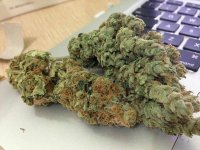You are using an out of date browser. It may not display this or other websites correctly.
You should upgrade or use an alternative browser.
You should upgrade or use an alternative browser.
Butane honey oil for dummies
- Thread starter Chiefsmokingbud
- Start date
whats the transparent skin leftover from some big bubbles after they burst? is this a sign i that i should increase my temps slightly? currently at 90-95f trying to avoid buddering from high temps
Essential oils film.
Are you using vacuum?
yep i'm using a 6cfm 2 stage vac and hydrion oven. i do the first pull and afer the muffin settles and some of the big bubbles burst i get left with a transparent film ontop of my oil in places. it also seems to go a bit crystalline if that makes sense, i'm not sure i'm making it warm enough as it doesn't really look wet
If anyone has Wikipedia editing privileges, the Wiki 'Hash Oil' article needs some work, i.e., "After obtaining BHO in this method, BHO producers will then vacuum purge their oil in a vacuum chamber.[citation needed] The primary purpose of this step is to purge the butane still remaining trapped within the oil, because butane can have adverse health effects if inhaled." http://en.wikipedia.org/wiki/Hash_oil
"because butane can have adverse health effects if inhaled."
Oh, really... and they are?
"because butane can have adverse health effects if inhaled."
Oh, really... and they are?
are these still places to get best pricing for tane??
bumpare these still places to get best pricing for tane??
are these still places to get best pricing for tane??
If you're in the US, search with the term BUTANE CANS at eBay, and compare prices versus quality using my Best to Worst Canned Butane List,
https://www.icmag.com/ic/showpost.php?p=6099306&postcount=28
The Best to Worst list is updated after every test.
I'm waking up every morning now thinking I should get involved in the distribution of butane with the guarantee every lot that passes through my hands has been sample tested. I frickin' can't believe no one will take my simple test and own the entire market, not even a stone greedy MFer... beyond crazy, Superstition at full volume 24/7.
Here's my basic non-volatile residue ('Mystery Oil') test:
Cut the top off a one gallon ziplock bag to further reduce the weight (generic bags are fine.)
Fold the bag up, place a rubber band around it, place it on a milligram scale, and record the tare weight.
Open the bag up wide, fold the top down one inch to stiffen it so it doesn't collapse, and place the bag into to an evaporating dish.
Place the evaporating dish in another dish like you would when doing an open blast boil off, warm water goes in the second dish...
Squirt a regular butane refill can's worth of solvent (about 300ml/165g) into a quart Mason jar. See the video, freezing the jar and solvent is of benefit in keeping the blow-by to a minimum.
Pour the solvent from the Mason jar into the bag.
Add warm water to the larger dish to speed up the boil off.
After boil off, pat dry the outside of the bag.
Vacuum down the bag to remove any volatile residue (like pentanes,) and moisture.
Fold the bag up, place the rubber band around it, place it on the milligram scale, and record the final weight.
The difference in weight is the amount of non-volatile residue ('Mystery Oil.')
Divide the weight of the non-volatile residue by the sample weight, and multiply the result by one hundred to obtain the percentage.
Notes:
Here's a video of how to squirt liquified gas into a Mason jar, "New Method for making BHO" by Jamus Herbeau,
https://youtu.be/VTVRYk0Zdg4?t=1s
Here's the milligram scale I use, and recommend,
http://www.amazon.com/American-Weig...d=1428083560&sr=8-1&keywords=milligrams+scale
To get accurate milligram readings every reading must be followed by a check with the calibration weights. I recalibrate over and over as the scale's readings drift as it warms up.
This test provides weight/percentage, odor, and tint of the non-volatile residue. Take a good whiff of the test bag before and after vacuuming down, there should be very little odor after vacuuming. Fold the residue area of the bag over a couple of times, and place on a white surface to check the tint. A little yellow tint is typical of Korean and Chinese gases even if it's good stuff otherwise.
Cut the top off a one gallon ziplock bag to further reduce the weight (generic bags are fine.)
Fold the bag up, place a rubber band around it, place it on a milligram scale, and record the tare weight.
Open the bag up wide, fold the top down one inch to stiffen it so it doesn't collapse, and place the bag into to an evaporating dish.
Place the evaporating dish in another dish like you would when doing an open blast boil off, warm water goes in the second dish...
Squirt a regular butane refill can's worth of solvent (about 300ml/165g) into a quart Mason jar. See the video, freezing the jar and solvent is of benefit in keeping the blow-by to a minimum.
Pour the solvent from the Mason jar into the bag.
Add warm water to the larger dish to speed up the boil off.
After boil off, pat dry the outside of the bag.
Vacuum down the bag to remove any volatile residue (like pentanes,) and moisture.
Fold the bag up, place the rubber band around it, place it on the milligram scale, and record the final weight.
The difference in weight is the amount of non-volatile residue ('Mystery Oil.')
Divide the weight of the non-volatile residue by the sample weight, and multiply the result by one hundred to obtain the percentage.
Notes:
Here's a video of how to squirt liquified gas into a Mason jar, "New Method for making BHO" by Jamus Herbeau,
https://youtu.be/VTVRYk0Zdg4?t=1s
Here's the milligram scale I use, and recommend,
http://www.amazon.com/American-Weig...d=1428083560&sr=8-1&keywords=milligrams+scale
To get accurate milligram readings every reading must be followed by a check with the calibration weights. I recalibrate over and over as the scale's readings drift as it warms up.
This test provides weight/percentage, odor, and tint of the non-volatile residue. Take a good whiff of the test bag before and after vacuuming down, there should be very little odor after vacuuming. Fold the residue area of the bag over a couple of times, and place on a white surface to check the tint. A little yellow tint is typical of Korean and Chinese gases even if it's good stuff otherwise.
Last edited:
Really
Really
Only the most irresponsible and fucking retarded would light them selves up with bho. Evaporating is the easiest part, after blasting in a safe place with a hot water bath and leave the immediate area after blasting tubes. just requires forethought in surroundings. And no electronics. To ensure more safety where all cotton to prevent static buildup
Really
I guess the value of not being burnt to a crips is worth it for some.
I get between 3 and 4 grams per ounce that i run> If i get that total amount the 73u would usualy be 1.5 to 2.5 grams worth. You may not get quite the same amount, but wow what value in the non chemical way, and trust that you dont need bubblebags to make bubble, some just prefer them.
peace
bubble man
Only the most irresponsible and fucking retarded would light them selves up with bho. Evaporating is the easiest part, after blasting in a safe place with a hot water bath and leave the immediate area after blasting tubes. just requires forethought in surroundings. And no electronics. To ensure more safety where all cotton to prevent static buildup
How tightly y'all pack tubes? Tough to describe tightness whew
Tamisium
Vendor
You can see from the images above that any combination or single solvent can be loaded into the automation system shown.
Tamisium Extractor Extraction Videos
These Tamisium Endorsed videos shed some light on extractors and extractions that will help everyone understand a lot more about extractors and extractions in general.
Thread Links
https://www.icmag.com/ic/showthread.php?t=314650
Direct youtube links
Tamisium Extractor TE3000/TE12000 Features Summary Video
https://www.youtube.com/watch?v=mo7HXKeXtnk
Tamisium Extractor TE3000/TE12000 Process Summary Video
https://www.youtube.com/watch?v=htp_BZByyeM
Tamisium Extracts Slideshow - Customer Submissions.
https://www.youtube.com/watch?v=NEGzkMbo2D8
After watching we hope you understand, we hope you know how to extract better and what tools you need to accomplish your extraction goals.
If you would like to contact Tamisium Extractors please do so through the site. www.tamisiumextractors.com
or call 817 726-7525 call text,
or email [email protected]
Some people may see some of these products customers submitted in the slideshow and feel they could do better. I agree, you may be able to but better is relative. There are markets that dictate what a product may look like and those products will be totally different. I cannot count the times I have got off the phone with a customer asking me how to produce a hard shatter only to answer another call from a customer only wanting the oil this other guy was trying to avoid. Or how someone only wants to extract a specific compound when another wants the whole spectrum. These images are of all those products and it was done with one apparatus. Some of the products are not in the MMJ market at all. Some are eaten, smoked, or used topically or further cleaned or isolated.
In addition just like cooking or baking, you improve with time. When so many variables can alter the outcome you have to get a feel for what those are. Spend the time performing some basic controlled extractions while changing one variable at a time and you will be on your way to success.
Think about like this...
There are 6 extraction controls you can alter in the Tamisium Process.
With only 3 changes to those 6 controls you will have 18 different outcomes.
but if you perform those 18 extractions you will a firm grasp on what you are capable of.
Last edited:
WeedyDoctor
New member
Thanx a lot
I want to try
I want to try
new to bho, familiar with qwiso, qwet and bubble.
Friend has some glass tubes a big and a small. So i might try some new sugar leaf out and some of the smaller popcorn buds.
1-With BHO is it better to dry out your material or to use fresh trim?
2-I have heard to keep the temp of the water in the pyrex under 105?
3-What do you do after it finishes bubbling on top of the hot water?
scrape? His first try was runny maybe water got to hot. At this point do you leave it on a hot plate? What temp?
4-is a vacuum purge required? If so cheap o vac chamber??
Thanks want to try it. Outside and carefully that is.
Hmmmm.......guess you gents are all passed the f out on this bho shiznits!
Friend has some glass tubes a big and a small. So i might try some new sugar leaf out and some of the smaller popcorn buds.
1-With BHO is it better to dry out your material or to use fresh trim?
2-I have heard to keep the temp of the water in the pyrex under 105?
3-What do you do after it finishes bubbling on top of the hot water?
scrape? His first try was runny maybe water got to hot. At this point do you leave it on a hot plate? What temp?
4-is a vacuum purge required? If so cheap o vac chamber??
Thanks want to try it. Outside and carefully that is.
Hmmmm.......guess you gents are all passed the f out on this bho shiznits!
Last edited:
Tamisium
Vendor
Clear oil extract tamisium TE175
Clear oil extract tamisium TE175
This was done with a TE175 and is clear as i have seen it so far. Notice how it darkens near the thicker center. The one on the right is from a TE3000. called it caviar. Both extractors could produce the same things as the others.
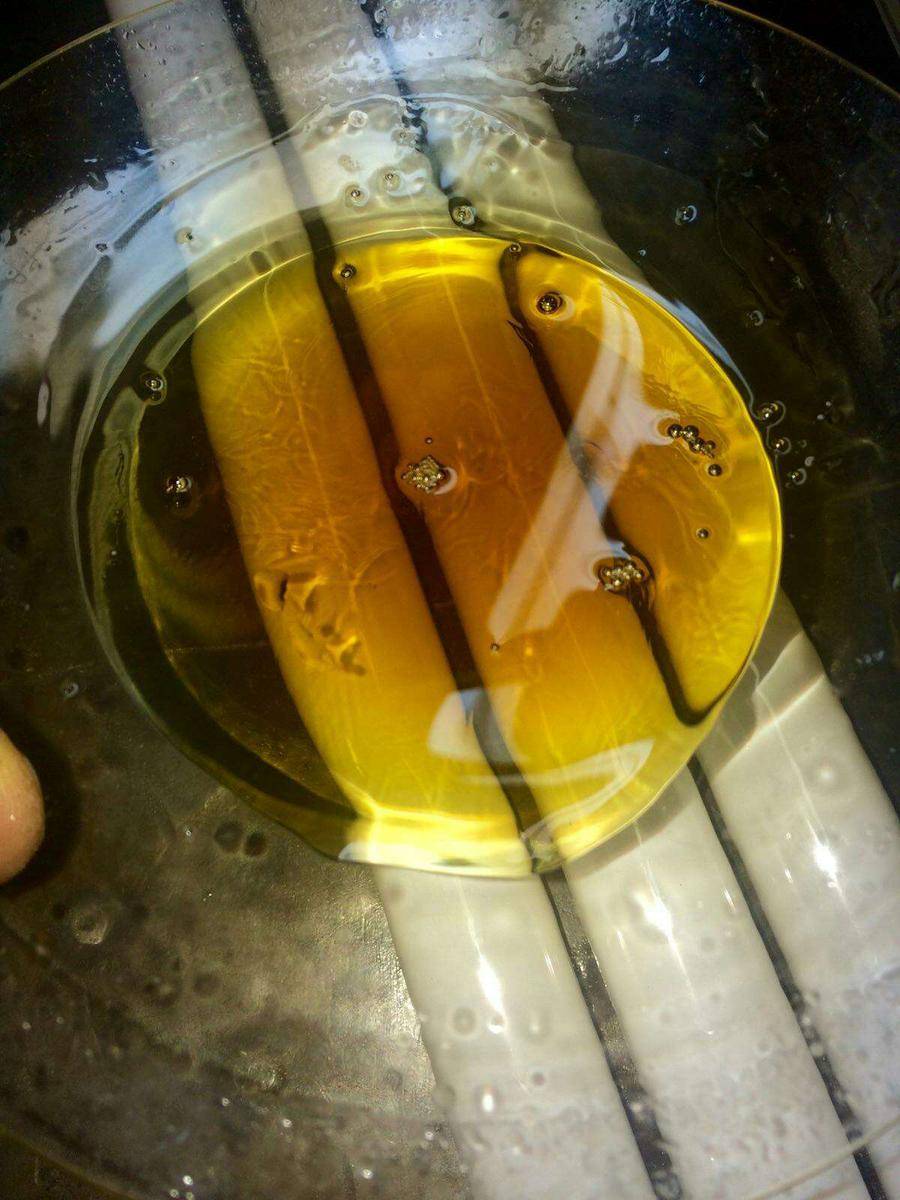
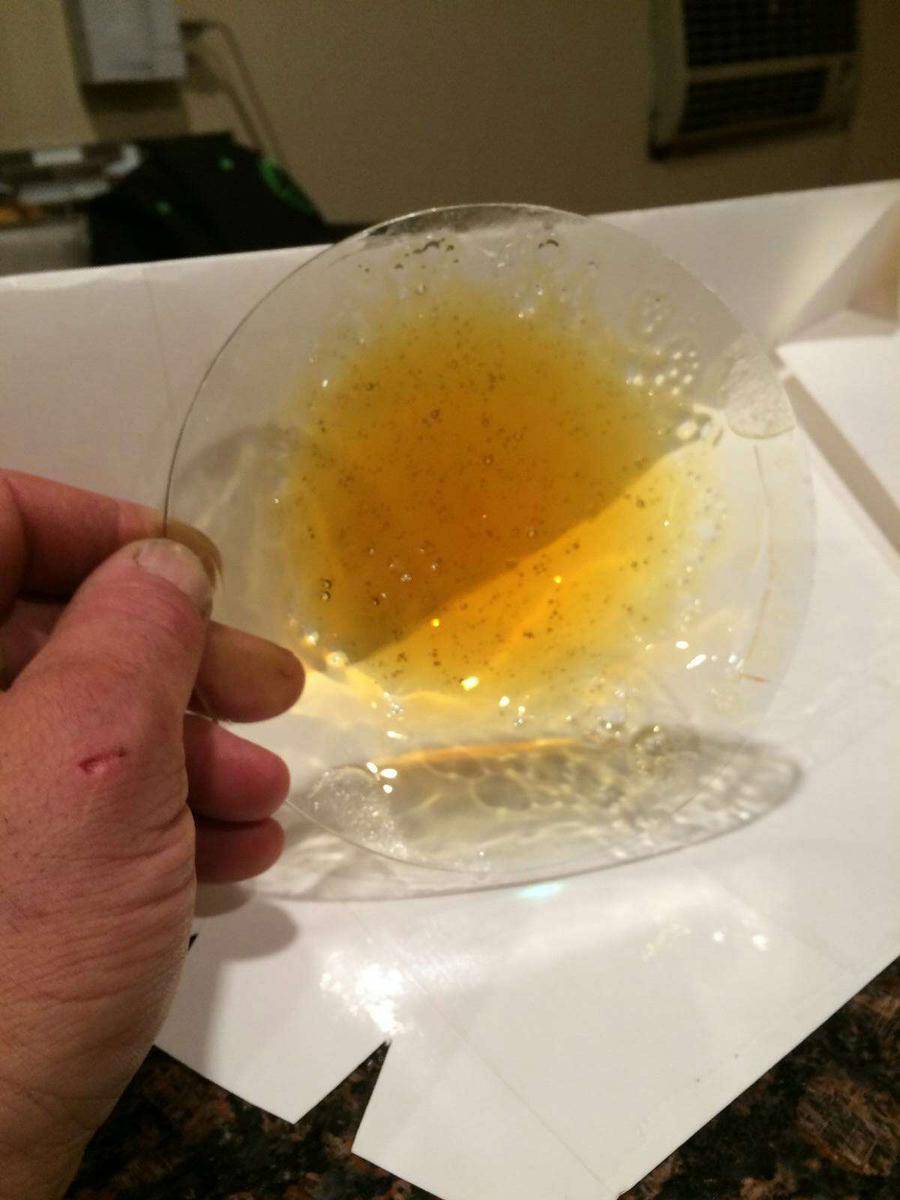

Clear oil extract tamisium TE175
Have you ever made "clear" hash oil? That is almost an impossibility, and never making it from weed will you ever get white or clear hash oil, you can get some thats a milky whit-yellow but you have to heat all the butane out, maybe white from fresh dry sift hash . I've heard of this but I personally think its a myth, just a tip for you if your going to set it in the water to heat it, dont get it that hot thats why your oil is turning red/orange. I allways scraped mine into a plie and then heated the bubbles out with a lighter, it's not like it's going to hurt you if you inhale it(you wont inhale the gas it ill catch on fire when you light it unless you are vapoing), we do it all the time unless you smoke with matches(lighters)
This was done with a TE175 and is clear as i have seen it so far. Notice how it darkens near the thicker center. The one on the right is from a TE3000. called it caviar. Both extractors could produce the same things as the others.
Tamisium
Vendor
Shared from Tamisium Extractors - 4 kilo Full Automation
Shared from Tamisium Extractors - 4 kilo Full Automation
[FONT=Arial, Helvetica, sans-serif]
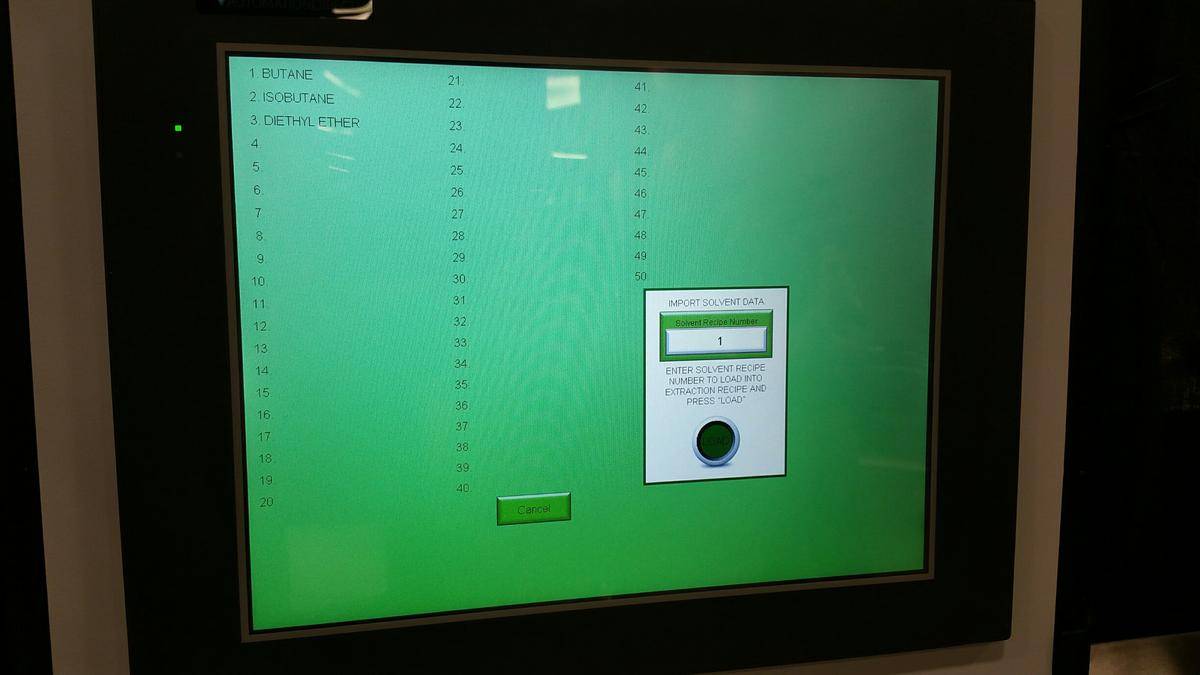
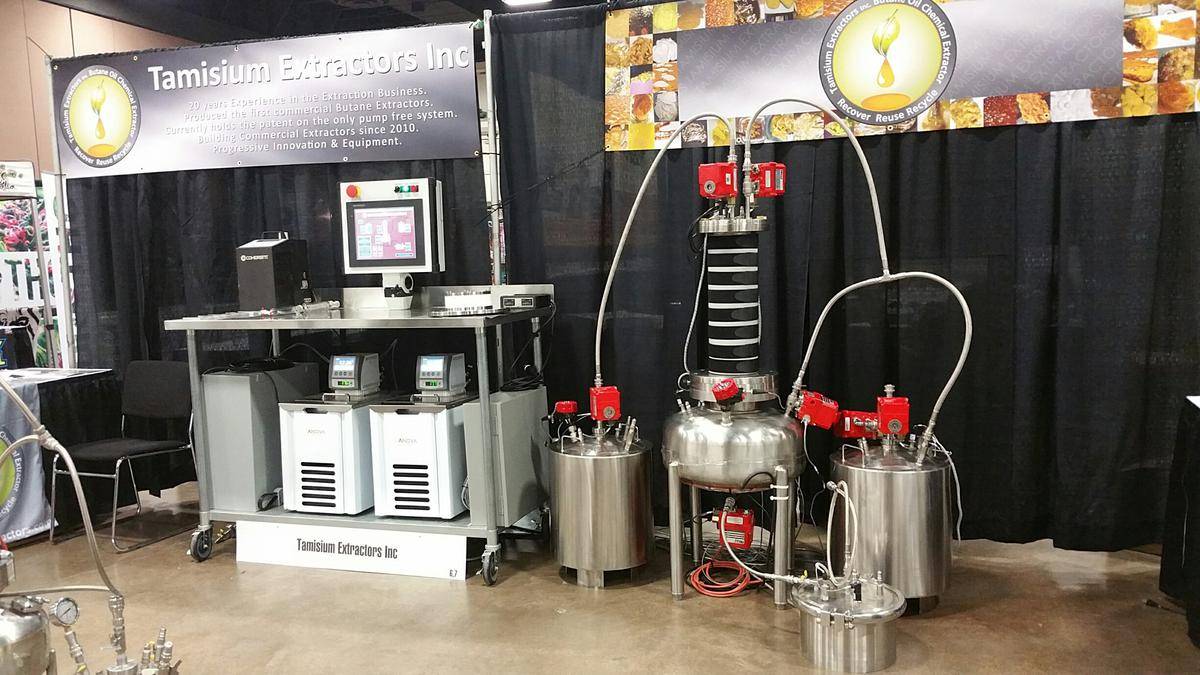

You can see from the images above that any combination or single solvent can be loaded into the automation system shown.
Tamisium Extractor Extraction Videos
These Tamisium Endorsed videos shed some light on extractors and extractions that will help everyone understand a lot more about extractors and extractions in general.
Thread Links
https://www.icmag.com/ic/showthread.php?t=314650
Direct youtube links
Tamisium Extractor TE3000/TE12000 Features Summary Video
https://www.youtube.com/watch?v=mo7HXKeXtnk
Tamisium Extractor TE3000/TE12000 Process Summary Video
https://www.youtube.com/watch?v=htp_BZByyeM
Tamisium Extracts Slideshow - Customer Submissions.
https://www.youtube.com/watch?v=NEGzkMbo2D8
After watching we hope you understand, we hope you know how to extract better and what tools you need to accomplish your extraction goals.
If you would like to contact Tamisium Extractors please do so through the site. www.tamisiumextractors.com
or call 817 726-7525 call text,
or email [email protected]
Some people may see some of these products customers submitted in the slideshow and feel they could do better. I agree, you may be able to but better is relative. There are markets that dictate what a product may look like and those products will be totally different. I cannot count the times I have got off the phone with a customer asking me how to produce a hard shatter only to answer another call from a customer only wanting the oil this other guy was trying to avoid. Or how someone only wants to extract a specific compound when another wants the whole spectrum. These images are of all those products and it was done with one apparatus. Some of the products are not in the MMJ market at all. Some are eaten, smoked, or used topically or further cleaned or isolated.
In addition just like cooking or baking, you improve with time. When so many variables can alter the outcome you have to get a feel for what those are. Spend the time performing some basic controlled extractions while changing one variable at a time and you will be on your way to success.
Think about like this...
There are 6 extraction controls you can alter in the Tamisium Process.
With only 3 changes to those 6 controls you will have 18 different outcomes.
but if you perform those 18 extractions you will a firm grasp on what you are capable of. [/FONT]
Shared from Tamisium Extractors - 4 kilo Full Automation
[FONT=Arial, Helvetica, sans-serif]
You can see from the images above that any combination or single solvent can be loaded into the automation system shown.
Tamisium Extractor Extraction Videos
These Tamisium Endorsed videos shed some light on extractors and extractions that will help everyone understand a lot more about extractors and extractions in general.
Thread Links
https://www.icmag.com/ic/showthread.php?t=314650
Direct youtube links
Tamisium Extractor TE3000/TE12000 Features Summary Video
https://www.youtube.com/watch?v=mo7HXKeXtnk
Tamisium Extractor TE3000/TE12000 Process Summary Video
https://www.youtube.com/watch?v=htp_BZByyeM
Tamisium Extracts Slideshow - Customer Submissions.
https://www.youtube.com/watch?v=NEGzkMbo2D8
After watching we hope you understand, we hope you know how to extract better and what tools you need to accomplish your extraction goals.
If you would like to contact Tamisium Extractors please do so through the site. www.tamisiumextractors.com
or call 817 726-7525 call text,
or email [email protected]
Some people may see some of these products customers submitted in the slideshow and feel they could do better. I agree, you may be able to but better is relative. There are markets that dictate what a product may look like and those products will be totally different. I cannot count the times I have got off the phone with a customer asking me how to produce a hard shatter only to answer another call from a customer only wanting the oil this other guy was trying to avoid. Or how someone only wants to extract a specific compound when another wants the whole spectrum. These images are of all those products and it was done with one apparatus. Some of the products are not in the MMJ market at all. Some are eaten, smoked, or used topically or further cleaned or isolated.
In addition just like cooking or baking, you improve with time. When so many variables can alter the outcome you have to get a feel for what those are. Spend the time performing some basic controlled extractions while changing one variable at a time and you will be on your way to success.
Think about like this...
There are 6 extraction controls you can alter in the Tamisium Process.
With only 3 changes to those 6 controls you will have 18 different outcomes.
but if you perform those 18 extractions you will a firm grasp on what you are capable of. [/FONT]
Tamisium
Vendor
less toxic than butane. ?? isobutane?
less toxic than butane. ?? isobutane?
Actually isobutane is not toxic and not less toxic than n butane because butane is not toxic either. Just to clarify.
Isobutane is not butane, not anymore anyway. It is an isomer of butane. There is only one butane in the molecular form. The letter N stands for Normal butane.
Nice post. Isobutane is actually a really nice easy to manage solvent though.
Butane is chosen because it is more selective. And when choosing a base primary solvent to select or target that is what you want. When you want to vary the polarity it is more consistent to vary from a known selective to widen the selection versus using one that is more broad like ethanol, propane acetone and so on.CO2 has the same problem among other things.
That is why butane is chosen over all others in addition to the fact that it can be recovered safely using distillation and it still boils low enough to be a candidate for volatile oil extractions.
None of this is neither here or there because any solvent, even toxic solvents, can be removed and even toxic solvents are commonly used to produce consumables, and even to kill pathogens during extraction. Some foods are immersed in toxic solvents to extend shelf life, after which they are removed or rendered non toxic by some type of molecular alteration such as in enzymatic reaction. Much like when beer or wine is made.
Another nice feature of butane is that it is predictable. This fact lends itself to automation processes where things are not so erratic and can be calculated more easily. Hence the Tamisium Automation process shown below. Understand that with an advanced automation process as shown any solvent the tanks are designed to handle in regards to pressure can be used in place or in combination with butane. You can see from the list that butane, isobutane and any other of over 100 choices can be selected to extract target or avoid anything during extraction from anything.
I see that you are sharing a lot of information so I wanted to share something with you and your readers.
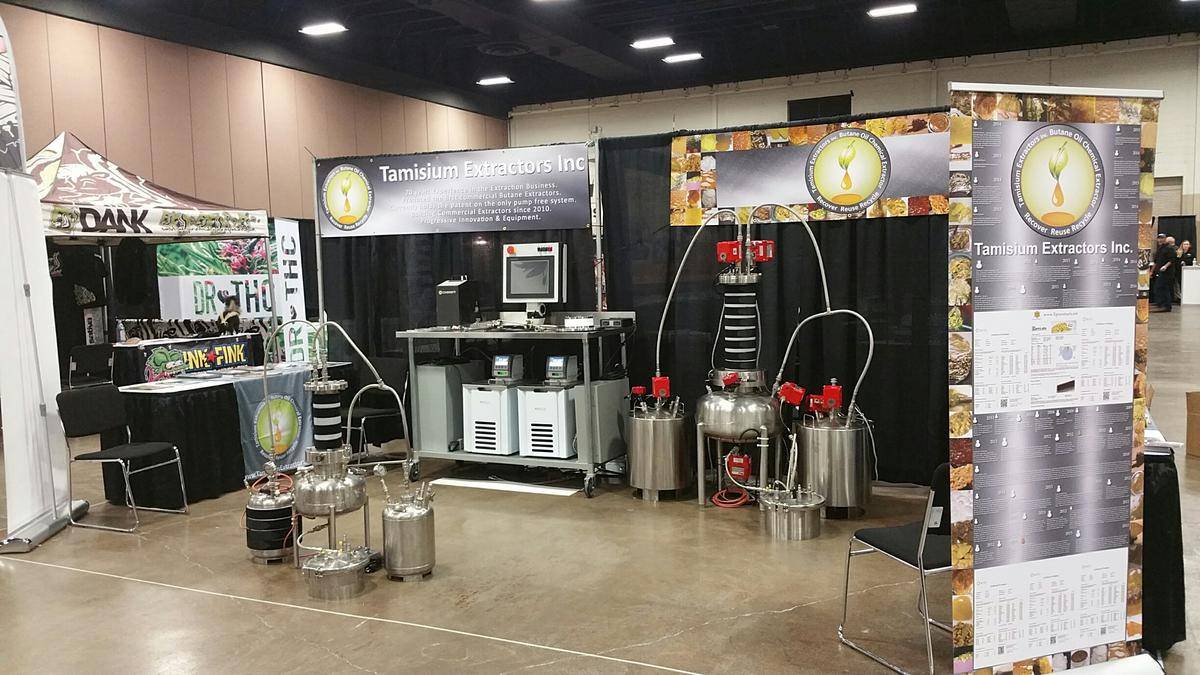



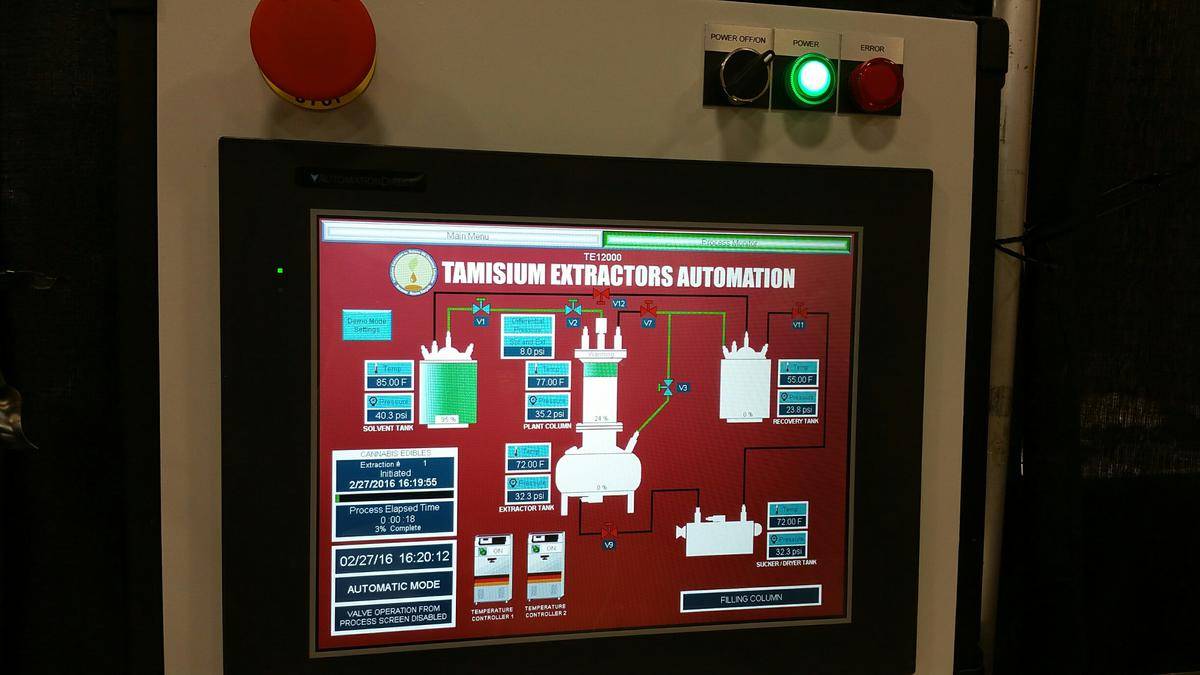
less toxic than butane. ?? isobutane?
Actually isobutane is not toxic and not less toxic than n butane because butane is not toxic either. Just to clarify.
Isobutane is not butane, not anymore anyway. It is an isomer of butane. There is only one butane in the molecular form. The letter N stands for Normal butane.
Nice post. Isobutane is actually a really nice easy to manage solvent though.
Butane is chosen because it is more selective. And when choosing a base primary solvent to select or target that is what you want. When you want to vary the polarity it is more consistent to vary from a known selective to widen the selection versus using one that is more broad like ethanol, propane acetone and so on.CO2 has the same problem among other things.
That is why butane is chosen over all others in addition to the fact that it can be recovered safely using distillation and it still boils low enough to be a candidate for volatile oil extractions.
None of this is neither here or there because any solvent, even toxic solvents, can be removed and even toxic solvents are commonly used to produce consumables, and even to kill pathogens during extraction. Some foods are immersed in toxic solvents to extend shelf life, after which they are removed or rendered non toxic by some type of molecular alteration such as in enzymatic reaction. Much like when beer or wine is made.
Another nice feature of butane is that it is predictable. This fact lends itself to automation processes where things are not so erratic and can be calculated more easily. Hence the Tamisium Automation process shown below. Understand that with an advanced automation process as shown any solvent the tanks are designed to handle in regards to pressure can be used in place or in combination with butane. You can see from the list that butane, isobutane and any other of over 100 choices can be selected to extract target or avoid anything during extraction from anything.
I see that you are sharing a lot of information so I wanted to share something with you and your readers.
This forum is in serious needs of some How-to's. If this has already been covered, excuse the redundancy. If you are here to bash the safety or consumption of honey oil, MOVE TO THE NEXT THREAD!
Disclaimer
Butane Honey Oil (BHO) extraction is an extremely dangerous activity. Butane is flammable, explosive and can potentially contain poisonous and harmful chemicals. Undertaking BHO extraction may result in serious bodily injury, or Death if proper precautions are not taken. The information provided on this website is strictly for educational purposes and in no way do the owners and staff of IC.mag encourage its production or use.
Butane is Highly Flammable and ALL extractions are to be done Outdoors Only, doing extractions indoors is extremely dangerous. There have been accounts of people blowing up their houses, kitchens, bathrooms doing Butane and other solvent extractions indoors.
Butane gas is heavier than air and will pool in low areas, if left to collect butane gas becomes flammable when it reaches 1.8% to 8.5% concentration in air. A small breeze will keep the butane from being able to pool and become dangerous.
It is recommended you take every precaution possible. Wearing Safety Equipment such as Eye protection, as well as gloves and always keep a fire extinguisher near by.
Butane and your health
Some brands of butane add a smell to their butane. This smell is usually added to the butane so that humans can detect leaks, you will find it in large amounts in cheap butane, or camping butane. It can also potentially be in “Clean” butane such as Colibri but i have never seen it. A prime example of smelly butane is Ronson brand
These chemicals are usually Mercaptans or Sulfur Dioxide (Rotten Egg Smell), using cheap butane with high levels of these is harmful, Do not use cheap butane or camping butane.
It is not known what the effects of residues in butane honey oil are; it’s not even known for sure what if any residues are left over in butane honey oil after the butane is purged.
Only a GC/MS (Gas Chromatography/Mass Spectrometer) can give us the info on what’s exactly is in our BHO. The search is on to find somewhere to get a sample tested.
Until Then, be aware of the potential health risks and judge for yourself if it’s worth it.
Not all butane is created equally; there are 2 different types of butane that make up the most common brands of butane. Isobutane and N-Butane.
Most cheap brands use Isobutane (2-METHYL PROPANE) and is more toxic and hazardous than N-Butane. For making Honey oil N-Butane is what we want, it extracts better and leaves very little to no residues in the oil.
Other brands use a mix of the different types, and some, like Colibri, use propane as well as Iso and n-butane
Boiling Points
ISOBUTANE: -11.7 C
N-BUTANE: -0.5 C
No source of pure N-Butane has been found available in stores, only through Gas Supply Companies. The best brand of butane I have used is Colibri Butane. I highly recommend Colibri, and you should be able to find it at most Fine Cigar and Tobacco Shoppe’s. Below is a list of other brands that are good for making Honey oil with. If you cannot find Colibri try to find one of the butane brands listed. And by all means avoid Ronson, Bernz-o-matic or other butane not listed below, they add smell to their butane and this smell is left behind making the oil taste very bad.
Other Brands that are good to use: COLIBRI, NEWPORT, CORA, CTC, COLTON, DUNHILL, DAVIDOFF, FACKELMAN, WIN, NIBO, SAROME, CALOR GAS MATCH, UNILIGHT, K2, SUPERGAS, VENTTI, VECTOR, King butane, Lucienne and Blaster. However this in no way is a complete list.
Places to get good butane online
http://kingbutane.com
Ebay
Blazer butane
When you purchase the butane make sure you find the largest size of can you can. I use the 300ml/167g (6oz) cans of Colibri. Most places only carry the little 2oz cans, these are not enough. You will need at least 8oz of butane for every 1oz of plant material.
If you find a brand that’s not listed you can do the mirror test to check to see if it’s ok to use. Spray butane on a clean mirror and let it evaporate. See Below.
Clean mirror
View Image
sprayed butane
View Image
Butane after evaporation......not good!
View Image
Plant Material
This is the most important factor if you wish to achieve high quality honey oil, Good fresh dried uncrushed bud makes the best honey oil, and you should easily achieve clear oil using uncrushed buds. Grind them up and do a second extraction to get a lower grade “B” wash, not as tasty or clear like the first batch.
Butane extracts the smell from the plant material, so if you have some great smelling buds the oil will also take on that smell. If you use bad smelling or tasting plant material, you will get bad tasting oil.
Using crappy plant material can also result in low yield a, remember "what you put it is what you get out".
- 1oz high quality 12oz butane needed 3-6g expected yield
- 1oz average 10oz butane 2-4g yield
- 1oz low grade(schwag) 9oz butane 2-3g yield
- 1oz high quality trim 12oz butane 3-5g
- 1oz trim and leaves 10oz butane 2-5g
- 1oz fan leaves 8oz butane 1-2g
The extraction tube
This might be the more difficult but essential piece of equipment to obtain. I personally use the okief x-tractor tube which is stainless and free standing. If you are the DIY type BY ALL MEANS you can always make your own. The extraction tube should be no wider than 1.5”, I find 7/8-1" to be the best. The tube should be made of Stainless steel or Thick glass Only, You can use a copper tube if you cannot find stainless or glass, but only if you clean the tube well before each extraction. Copper tarnishes and the tarnish can potentially be extracted by the butane, it also has that nasty copper smell which can be carried to your oil. You can also use aluminum but that would occasionally need to be cleaned as it oxidizes in high humidity.
Avoid ALL Plastics, brass, steel and galvanized steel pipe, these all can contaminate your oil and make you sick.
Phife uses a cheap stainless steel turkey baster which works very well with little modification and is OK for small amounts.
The extraction
Make sure your plant material (Leaves, Trim, Stems, or Buds) is very dry, the dryer the better. If you want clear honey oil with a lower yield, pack the tube without grinding or breaking up the plant material. If you use whole nugs that are very dense, it's best to brek them up a little to allow more exposed trichomes. The butane will extract the high quality oil on the outside of the plant material then unpack the tube, Grind up the plant material lightly and definitely not a powder for a lower grade oil.
The better the starting material the better the oil. If you use males or just fan leaves don’t expect awesome oil or mush oil at all. You can also use butane extraction to salvage moldy buds.
Fill the extraction tube full with the powdered plant material; avoid making air pockets in the tube. I like to fill the tube a little then lightly push it down till i feel slight resistance and repeat until the tube is full.Never pack the tube like you would a cannon, this causes dense spots that make it difficult for the butane to pass, causing back pressure and possibly a blowout = a face full of tane.
Don’t pack it to much and try to make sure the tube is full, if you don’t have enough plant material to fill your tube then try to get a smaller tube. Air pockets let the liquid butane expand to gas and lower the efficiency a little. After your tube is filled then you can place your screen on the bottom, . The picture shows a steel mesh screen on an okief tube Find some way to mount the tube on a stand or get an oven mitt as the tube gets very cold, and you won’t be able to hold it with your bare hand for very long.
View Image
Before i go OUTSIDE, i place a large pan of water on the stove and turn the burner on high. You want the pan of water Hot BUT NOT BOILING
View Image
You will want to use a pyrex dish that will easily fit inside your pan of water. Be sure the dish is atleast 1.5" deep. Next take all your stuff outside.
I place the tube in the pan and begin injecting butane, i do this for 30 seconds, stop and wait 15 seconds and continue till the can is empty. You will know the can is empty when you hear a slight pitch in sound coming from the can. For this run i used 2 6oz cans per tube.(you will see some already dark areas in the pan, that was some left over from a previous run)
View Image
Once you have finished let the tube sit till it stops dripping. Go get your pan of hot water and TAKE IT OUTSIDE to purge the butane from your oil. Besure your water is not BOILING. This will cause a violent reaction when the freezing butane meets boiling water and go everywhere.
View Image
It really starts going after about 15 seconds
View Image
Getting close to done
View Image
View Image
Done with this portion. Notice the cloudy bubbles - trapped butane. At this point i pop the bubbles and place the dish on a heating pad on high for one hour, to insure all butane is gone.
View Image
Placed on a heating pad -set on low-for one hour.
View Image
Purged oil
View Image
Now for the rewarding part....the scrape
View Image
View Image
I would also like to point out that foaf has a method to avoid scraping, using a teflon bag.....ingenious: The foaf method
Depending on how well your oil is purged and the quality of material used you can wind up with some very fine hard oil. These sculptures sre entirely of hard honey oil
View Image
View Image
View Image
By all means use safety precautions and do everything outside.Be safe and enjoy!
*Credits to Phife and foaf for some of this information*
I was wondering, if I put 10g of Skywalker or em' Dog (in orde of the picture) how much oil its expected to get?
Thanks in advanceD
View Image
An early Skywalker produced the closest to clear and colorless, than any other strains that we've extracted. In cotton candy form, it was pearlescent white, and in shatter form, it greyed instead of turning amber with added layers.
I don't remember the yield, but it wasn't startling one way or the other and we typically get 18 to 25%, depending on strain.
Tamisium
Vendor
solvent yields closed passive systems
solvent yields closed passive systems
In any solvent extraction where you can add time and temperature your yields will be the highest. More time and temp the higher but expect to max out at around 95-98% of what is in the plant. So that depends on what is in there to begin with. But with numbers like that you can use the process to tell you that.
The key is matching the polarity exactly and finding the right combination of all those controls.
solvent yields closed passive systems
I was wondering, if I put 10g of Skywalker or em' Dog (in orde of the picture) how much oil its expected to get?
Thanks in advanceD
View Image
In any solvent extraction where you can add time and temperature your yields will be the highest. More time and temp the higher but expect to max out at around 95-98% of what is in the plant. So that depends on what is in there to begin with. But with numbers like that you can use the process to tell you that.
The key is matching the polarity exactly and finding the right combination of all those controls.


